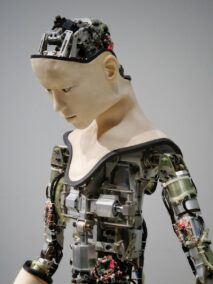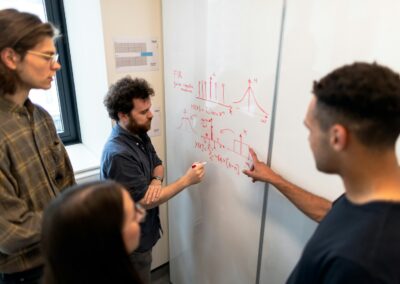Revolutionizing Education with AI-Powered Feedback Systems
Enhancing Student Learning with Real-Time Feedback
The integration of AI in real-time assessment and feedback is transforming the educational landscape, offering unprecedented opportunities for enhancing student learning and growth. In regions like Saudi Arabia and the UAE, where technological advancement is a priority, AI’s role in education is becoming increasingly significant. Real-time feedback provided by AI systems allows educators to address student needs promptly and effectively, fostering a more dynamic and responsive learning environment.
One of the primary benefits of AI-powered feedback is its ability to provide immediate and personalized responses to student performance. Traditional assessment methods often involve delays, which can hinder the learning process. With AI, students receive instant feedback on their work, enabling them to understand their mistakes and correct them without waiting for days or weeks. This immediate feedback loop is crucial for subjects that require continuous practice and improvement, such as mathematics and science.
Furthermore, AI systems can analyze vast amounts of data to identify patterns and trends in student performance. This analysis helps educators tailor their teaching strategies to meet the individual needs of each student, promoting a more personalized learning experience. By understanding where students struggle and excel, teachers can provide targeted support and resources, ultimately improving overall learning outcomes.
Supporting Educators in Delivering Effective Instruction
AI not only benefits students but also supports educators in delivering more effective instruction. By automating the assessment process, AI systems free up valuable time for teachers, allowing them to focus on interactive and engaging teaching methods. This shift from manual grading to AI-powered assessment can significantly reduce the administrative burden on educators, enabling them to dedicate more time to student interaction and personalized instruction.
In addition to streamlining administrative tasks, AI systems provide educators with detailed insights into student performance. These insights include data on individual and class-wide trends, helping teachers identify common areas of difficulty and adjust their teaching strategies accordingly. For example, if an AI system detects that a significant number of students are struggling with a particular concept, the teacher can revisit that topic and provide additional explanations or resources.
Moreover, AI-powered feedback systems can assist in creating differentiated learning paths for students. By continuously monitoring and analyzing student performance, AI can recommend personalized learning activities and resources that cater to each student’s unique needs. This personalized approach ensures that all students, regardless of their learning pace or style, receive the support they need to succeed.
Promoting Continuous Improvement and Growth
Real-time assessment and feedback powered by AI also play a critical role in promoting continuous improvement and growth among students. By providing ongoing feedback, AI systems encourage a growth mindset, where students view challenges as opportunities for learning and development. This approach contrasts with traditional assessment methods, which often focus on final grades and can discourage students from taking risks or attempting difficult tasks.
AI-powered feedback systems can also track and document student progress over time, providing a comprehensive view of their learning journey. This longitudinal data helps educators and students set realistic goals and monitor progress toward achieving them. It also allows for early intervention when a student is struggling, ensuring that they receive the necessary support to get back on track.
Incorporating AI in education is particularly beneficial in regions like Riyadh and Dubai, where there is a strong emphasis on leveraging modern technology to drive educational success. These cities are at the forefront of adopting innovative educational practices, and AI’s role in real-time assessment and feedback aligns with their vision of creating dynamic and effective learning environments.
Implementing AI-Powered Feedback Systems in Educational Institutions
Case Studies from Saudi Arabia and UAE
Several educational institutions in Saudi Arabia and the UAE have successfully implemented AI-powered feedback systems, leading to notable improvements in student engagement and academic performance. For instance, a leading university in Riyadh integrated AI-driven assessment tools into its curriculum, resulting in higher student satisfaction and better learning outcomes. The immediate feedback provided by AI systems allowed students to identify and address their weaknesses promptly, leading to a more effective learning process.
In Dubai, a prestigious international school introduced AI-powered feedback in its science program. The implementation of AI systems provided real-time insights into student performance, enabling teachers to tailor their instruction to meet individual student needs. As a result, the school reported significant improvements in student engagement and academic achievement, demonstrating the positive impact of AI on education.
These case studies highlight the potential of AI to revolutionize education by making learning more responsive, personalized, and effective. As more institutions in the region adopt AI-powered feedback systems, they are likely to see similar positive results, further establishing Saudi Arabia and the UAE as leaders in educational innovation.
Overcoming Challenges in AI Implementation
Despite the numerous benefits, implementing AI-powered feedback systems in educational institutions comes with its own set of challenges. One of the primary concerns is the initial cost of technology adoption and integration. However, many institutions are finding ways to overcome this hurdle through partnerships with technology providers and government initiatives aimed at promoting digital education.
Another challenge is ensuring data privacy and security. With AI collecting and analyzing large amounts of student data, institutions must implement robust security measures to protect this sensitive information. Clear data governance policies and advanced encryption technologies are essential to maintaining student trust and complying with regulatory requirements.
Teacher training and acceptance are also critical factors in the successful implementation of AI-powered feedback systems. Educators need to be trained not only in using these technologies but also in integrating them effectively into their teaching strategies. Continuous professional development and support can help teachers adapt to these new tools and maximize their potential in the classroom.
The Future of AI in Education
The future of AI in education looks promising, with continuous advancements in technology paving the way for more sophisticated and effective educational tools. As AI becomes more integrated into learning environments, we can expect even greater levels of personalization, engagement, and interactivity. This will not only improve student outcomes but also prepare them for the challenges of a rapidly evolving technological landscape.
Moreover, the expansion of AI-powered feedback systems into new subject areas and educational levels will further enhance its impact. From K-12 education to higher education and professional training, AI has the potential to transform learning experiences at all stages of education. This holistic approach ensures that students are equipped with the skills and knowledge they need to succeed in their academic and professional endeavors.
In conclusion, the integration of AI in real-time assessment and feedback offers numerous benefits, from personalized learning experiences to enhanced student engagement and continuous improvement. As educational institutions in Saudi Arabia, the UAE, Riyadh, and Dubai continue to adopt these innovative technologies, they are setting a new standard for education in the 21st century. By embracing AI, these institutions are not only improving learning outcomes but also preparing students for success in a dynamic and competitive global landscape.
—
#AIinEducation #RealTimeAssessment #StudentFeedback #LearningAndGrowth #SaudiArabia #UAE #Riyadh #Dubai #ArtificialIntelligence #Blockchain #TheMetaverse #ExecutiveCoaching #GenerativeAI #ModernTechnology #BusinessSuccess #LeadershipSkills #ManagementSkills #ProjectManagement

























